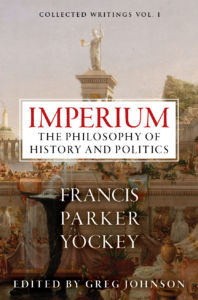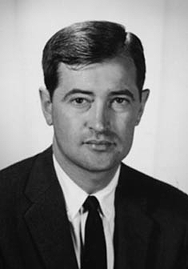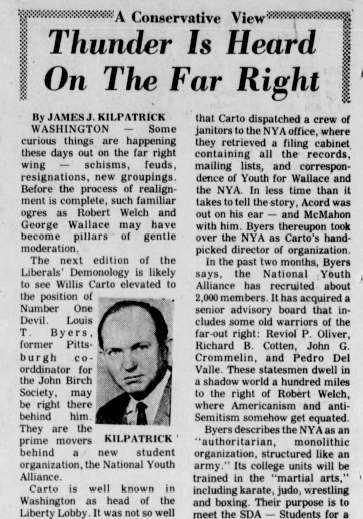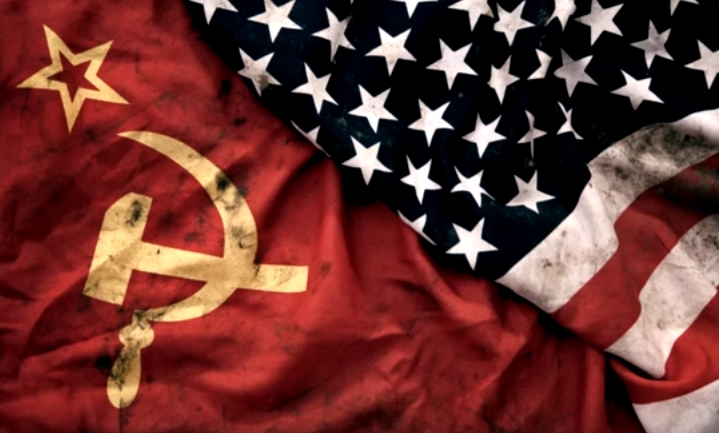Carto and the Conservatives
The following is a commemoration for Willis A. Carto, who was born 97 years ago today.
For me, one of the great takeaways from the Willis Allison Carto Online Presidential Library is watching the conservative mainstream drift off into the distance while Mr. Carto basically stayed in the same place. Beginning in the mid-1950s and rolling through later correspondence is like standing in the middle of “Pangea” — the theoretical original single continent that all of Earth’s present continents were once part of — and watching plate tectonics gradually pull the various pieces away from the center.
In 1955, most “conservatives” espoused more or less the same beliefs and attitudes that Carto & Co. would still be upholding 20, 30, and 40 years later. Carto didn’t leave conservatism; Conservatism Inc. left him.
Not everyone drifted far, of course. Avery Brundage was a good, solid egg who knew enough to keep a low political profile. Westbrook Pegler used his column to praise the young Carto in 1955, and a decade later, forcibly retired, was still sending him funny missives. Revilo P. Oliver always remained cordial, though his experience with “the Bircher Business” made him chary of endorsing any organization larger than himself and his wife.
Even Bill Buckley was friendly till the early 1960s . . . and when relations turned chilly it wasn’t because of race or segregation (the two men were on the same page there for a long time), but rather over free trade, with Buckley taking the libertarian “market” side against what I should consider the true-conservative endorsement of tariffs and any other practical and necessary types of trade protection. Buckley’s stance wasn’t necessarily a sincere, deeply held belief, but it was necessary to keep the libertarian ideologues happy at National Review. In a vague way, Bill imagined NR was carrying forward the torch of Albert Jay Nock, a sometime free-market and anti-statist hero of his youth. Bill had to exile Prof. Oliver from the magazine for very different practical reasons, but I have it on personal testimony that the Buckley family remained fond of RPO.
One can see storm signals arise already in 1958 for Carto in a curious communication from the new editor of The American Mercury, William LaVarre. LaVarre returns a manuscript to Carto, apparently unread. It may have been written by, or was of interest to, Lawrence Dennis, since Dennis is copied in the correspondence chain. LaVarre completely balks at the submission, and obliquely hints that Carto has some dodgy “West Coast associations,” and consorts with “‘lunatic’ fringe” types and others who lack “community prestige.” Carto fires back a whaaat? letter, whereupon Mercury Publisher Russell Maguire warmly apologizes to Carto for his editor’s rudeness. But the questions remain answered: Who were these bad associations, and who exactly was leaning on William LaVarre?
LaVarre took the editorship in 1957, around the time that Bill Buckley declared that anyone who wrote for American Mercury could not write for National Review. LaVarre may simply have decided to follow Buckley’s example, or maybe he was just encountering the same obstacles that plagued Buckley. It was basically a question of distribution. Most magazines did not depend entirely, or even mostly, on mail subscriptions; they needed newsstand sales. Magazines cost 15 cents or a quarter: pin-money impulse purchases, you’d read ’em on the commuter train or after dinner. There were only a handful of distributors, and they acted as a cartel. I remember back in the mid-‘60s you couldn’t find Mad magazine at many newsdealers around New York because William Gaines was fighting with the distributors, who retaliated by giving Mad‘s shelf-space to Cracked and Sick instead. And Cracked and Sick were pretty terrible, let me tell you.

You can buy The World in Flames: The Shorter Writings of Francis Parker Yockey here.
Likewise, National Review had distributorship problems in the 1950s and early ‘60s because some NR writers were essentially on a blacklist as “anti-Semites.” Bill Buckley himself, in fact, was considered dubious because he was a Professional Conservative — strike one! — while his father was well known to the Anti-Defamation League (ADL) for trying to keep Jews out of his corner of Connecticut — strike two!
When Gore Vidal libeled the Buckley family in the September 1969 issue of Esquire, it was just old news from Arnold Forster and his ADL hate-file. Bill had to keep people like Prof. Oliver out of National Review because RPO had suddenly become a founding member of the John Birch Society — and the JBS, in the ADL’s 1958 ideology, was ipso facto an aunty-seemite organization. (Even after a million sellouts by Robert Welch and company, some people still do believe that about the JBS, even today.)
To keep National Review alive and in distribution, Buckley had to make nice with the Mephistophelean powers that were: no RPO, no JBS, no friendly letters to Willis Carto and Liberty Lobby. And thus, after a dozen years, Buckley finally scored a nasty Time cover (1997) with a caricature by David Levine.
But bringing The American Mercury out of purdah was a different thing entirely, a hopeless effort. It would always be this fringe magazine that William F. Buckley, Jr., George Lincoln Rockwell, and William Bradford Huie, checkbook journalist on the Emmett Till trial, once worked on or wrote for. The hapless William LaVarre was snorting fire to no practical end at all.
Myself, I only discovered the still-extant American Mercury in the early 1970s because my college library had been subscribing for 50 years and its octavo-sized issues were pigeonholed right next to the similarly-shaped American Opinion slot in our Periodical Reading Room. By that point the Mercury had failed so badly it was now owned by Carto’s Liberty Lobby. If you subscribed to it, you also got Liberty Lobby’s Washington Observer newsletter, a sort of “Not an awful lot of advertising revenue”; often just back-cover ads for The Six Million Swindle by Prof. Austin J. App (Scranton University; LaSalle University; PhD, Catholic University of America), which was probably published by a Carto publishing house on the West Coast.
What’s missing from the Carto website is correspondence from sometime Richmond News-Leader editor and veteran columnist James J. Kilpatrick. This is too bad, because Kilpatrick is one of the few classic American conservatives who stayed the course until the pressures became unbearable, and they had to start paying lip-service to race-egalitarian nonsense, if they wished to keep their newspaper or syndication alive. In Kilpatrick’s case this seems to have happened around 1970. As a reward for his sellout, Kilpatrick got to become a popular television personality, trading barbs with Shana Alexander on 60 Minutes‘ “Point-Counter-Point” segment . . . and then being lovingly parodied by Dan Ackroyd and Jane Curtin during the early Michael O’Donoghue genius-era of Saturday Night Live (“Jane, you ignorant slut!“).


You can pre-order the Centennial Edition of Francis Parker Yockey’s Imperium here.
But Kilpatrick did not completely sell out, or disavow his roots. There came a time when certain Washington columnists — mainly the “Washington Merry-Go-Round”‘s Drew Pearson, and his Igor/successor, Jack Anderson — decided to attack Willis Carto for having masterminded or subverted a 1968 Youth for Wallace movement. Their columns were relentless, full of cheap shots, but they had detected that the Youth for Wallace had been transformed into something called the National Youth Alliance. Pearson and Anderson wouldn’t give up. In 1969 they ran continuous exposés in their columns about how Willis A. Carto was behind the whole thing, and that he was using it to push a subversive tract by Francis Parker Yockey called Imperium.
James J. Kilpatrick treated it all as a joke. He was often used by syndicates as a substitute columnist when William F. Buckley, Jr. was on vacation, and so this column — May 29, 1969 — went far and wide: “The next edition of the Liberals’ Demonology is likely to see Willis Carto elevated to the position of Number One Devil.”
Today we’ve long known that the National Youth Alliance was the early edition of the National Alliance, but in 1969-71 it was easy to frame it all as a sinister fad, something masterminded by one Willis Carto of Washington, DC, Sausalito, and points south. There was dissension in the post-Youth for Wallace movement, with one faction going for a populist-conservative orientation that was friendly to the Young Americans for Freedom and NR types, and the other side going for a radical, Yockeyist point of view and calling itself the National Youth Alliance. You can decide for yourselves which side, if any, succeeded.
I have a sentimental attachment to this fracas, because it was what first brought me into some kind of vague kind Rightist movement, a few years later. National Review had run an out-of-left-field article by one C. H. (“Chris”) Simonds, attacking Willis A. Carto (in the September 10, 1971 issue). Shortly afterwards, advertisements began to appear — in popular magazines, not National Review — warning young people to avoid youth alliances of all sorts, particularly those promoting the sinister bible called Imperium.
* * *
Counter-Currents has extended special privileges to those who donate $120 or more per year.
- First, donor comments will appear immediately instead of waiting in a moderation queue. (People who abuse this privilege will lose it.)
- Second, donors will have immediate access to all Counter-Currents posts. Non-donors will find that one post a day, five posts a week will be behind a “Paywall” and will be available to the general public after 30 days.
- Third, Paywall members have the ability to edit their comments.
- Fourth, Paywall members can “commission” a yearly article from Counter-Currents. Just send a question that you’d like to have discussed to [email protected]. (Obviously, the topics must be suitable to Counter-Currents and its broader project, as well as the interests and expertise of our writers.)
To get full access to all content behind the paywall, sign up here:
Paywall Gift Subscriptions
 If you are already behind the paywall and want to share the benefits, Counter-Currents also offers paywall gift subscriptions. We need just five things from you:
If you are already behind the paywall and want to share the benefits, Counter-Currents also offers paywall gift subscriptions. We need just five things from you:
- your payment
- the recipient’s name
- the recipient’s email address
- your name
- your email address
To register, just fill out this form and we will walk you through the payment and registration process. There are a number of different payment options.





